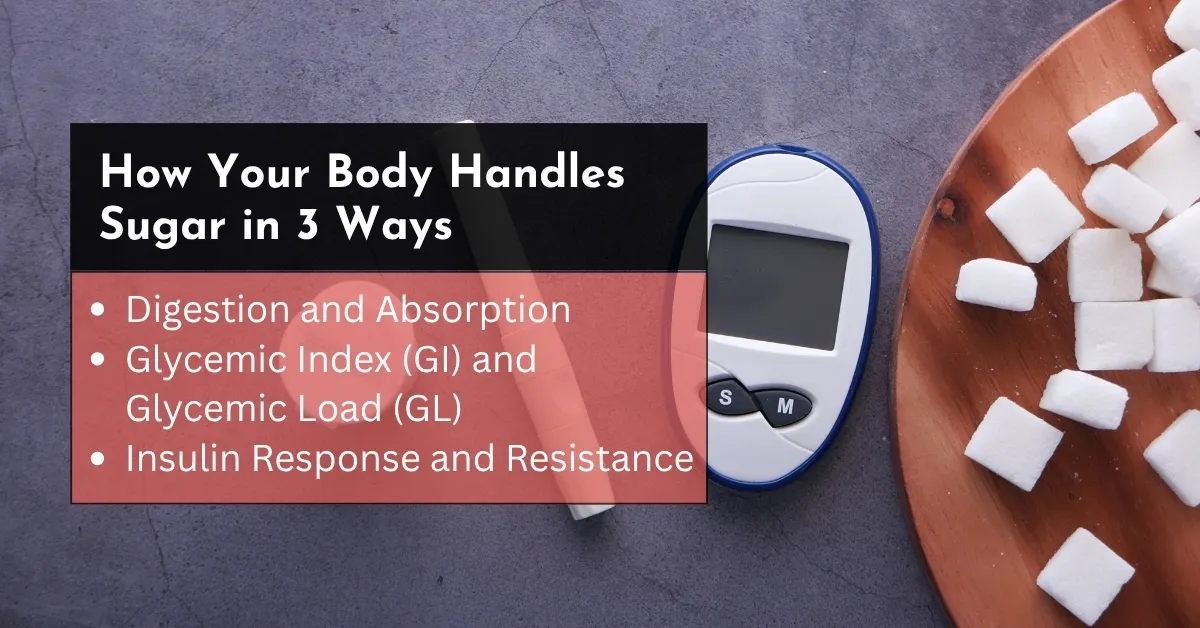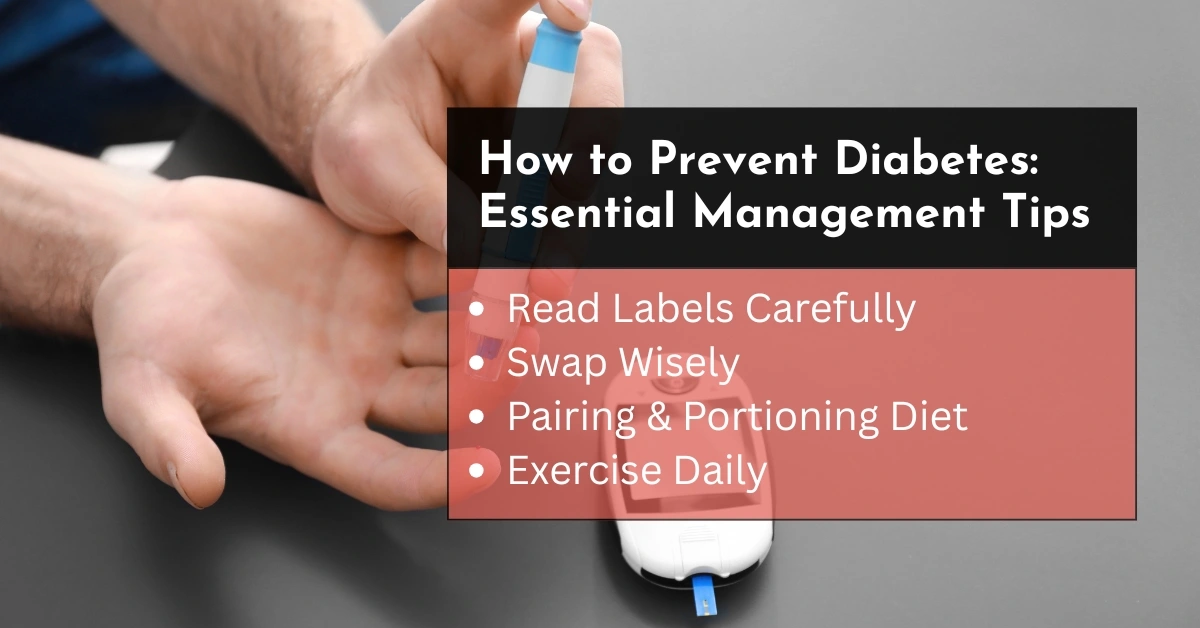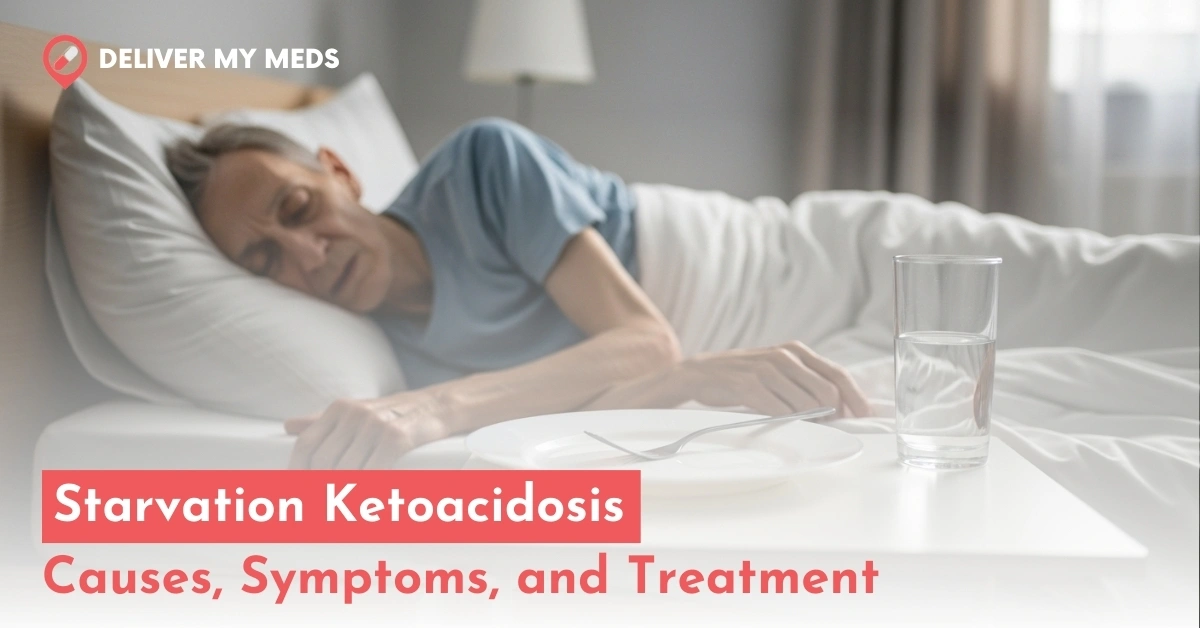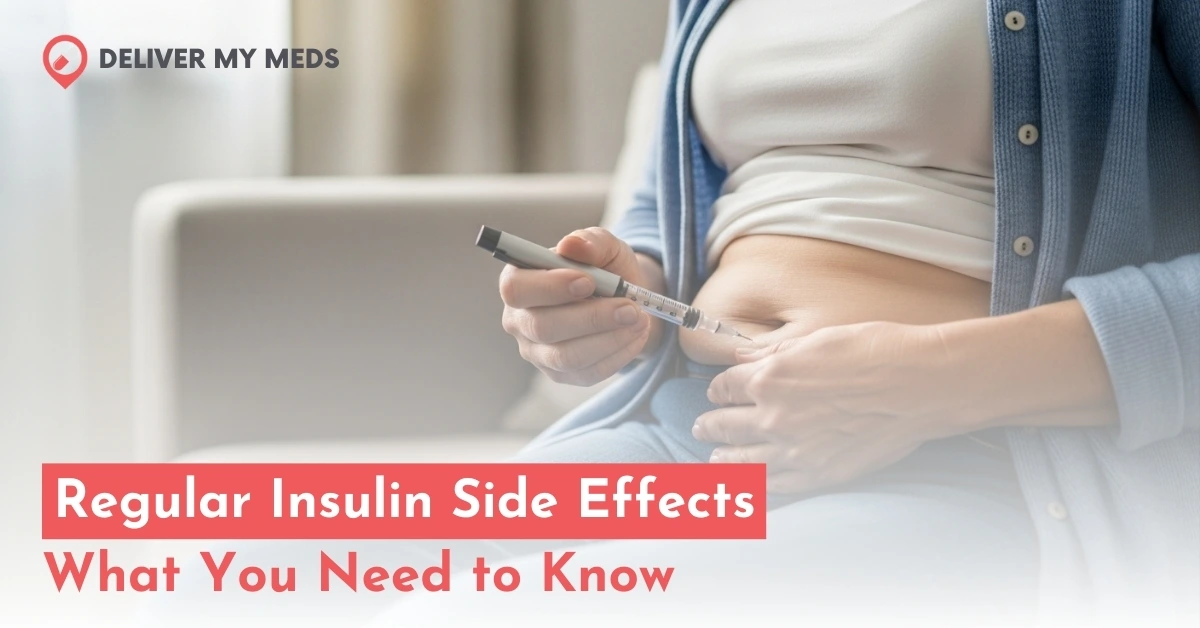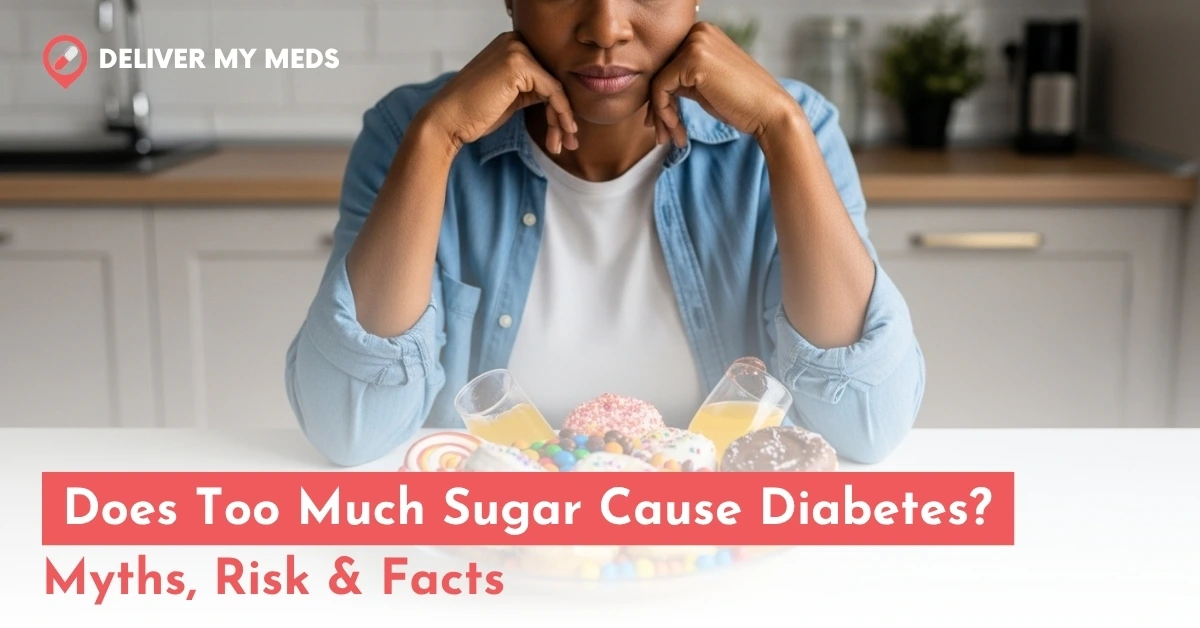
There has been a sugar epidemic in America for a while and there are still questions, like “Does eating too much sugar cause diabetes?” Or, “Do you get diabetes just from sugar or eating something that has carbohydrate value?”. There is a correlation, but sugar doesn’t directly cause diabetes. However, consuming lots of sugary foods (from sodas, juices, or processed snacks) or eating too much sugar does cause weight gain and insulin resistance. Both of these are the main causes of Type 2 diabetes.
Some individuals worry that all sugars are the same; that’s not true. The diabetic patient sometimes needs sugar, like when they have low sugar, particularly after insulin or certain medicines. Diabetes users think the body’s relationship with sugar is simple, but it’s not that easy.
In this blog, we’ll explain how sugar affects your body, what the science says about diabetes risk, and most importantly, what you can do to stay healthy. And if you already manage diabetes, many CGM sensors are here to help with fast shipping right to your doorstep.
What Is Diabetes and Why Is Sugar Blamed?
Sugar isn’t a direct cause of diabetes, but it contributes by increasing the risk factors. The truth is, sugar doesn’t directly cause diabetes, but it can raise the risk of type 2 diabetes by adding calories, increasing body fat, and weakening how the body uses insulin.
- Type 1 diabetes happens when the immune system destroys insulin-producing cells. It has nothing to do with sugar.
- Type 2 diabetes develops when the body stops responding properly to insulin, often due to excess body fat. That’s where sugar becomes a concern; it adds empty calories that lead to weight gain and insulin resistance.
Dr Explains that:
If you’re not overweight, extra sweets may not be harmful. But eating sugary foods daily can raise your risk.
Also, why do diabetics need sugar sometimes? Because low blood sugar (hypoglycemia) can happen with insulin or medication, fast sugars like juice or glucose tablets are used to treat it. So, can sugar cause type 2 diabetes? Not by itself, but in the wrong setting, it becomes part of the problem.
Devices like the FreeStyle Libre 3 Reader or Dexcom G7 starter kit from DMM can alert you early to hypoglycemia, helping you act before symptoms worsen.
How Your Body Handles Sugar in 3 Ways
a) Digestion and Absorption
- All carbohydrates break down into glucose or fructose.
- Natural sugars (e.g., in fruit) are absorbed slowly due to fiber.
- Added sugars spike blood glucose quickly.
b) Glycemic Index and Load
| Food | Glycemic Index (GI) | Glycemic Load |
| Banana | ~50 | Moderate |
| Cola (12 oz) | ~63 | High |
Cola causes a higher insulin response due to a lack of fiber. That’s the issue at the heart of sugar issues: not all sugar sources behave equally. If you want to learn about low glycemic food options that fit your diet plan, read CGM’s Monitors’ blog.
c) Insulin Resistance Pathway
- Excess sugar increases total calorie intake
- Excess calories are stored as fat (especially around organs)
- Fat tissue reduces insulin sensitivity
- Pancreas overworks, eventually fails, type 2 diabetes
So, when asking, “Can sugar give you diabetes?” The answer is: not directly, but sugar can indirectly lead to diabetes by promoting insulin resistance over time.
Direct vs Indirect Risk from Sugar
Numerous studies confirm:
- A 12-ounce sugary drink per day raises type 2 diabetes risk by 20-25%, even if you’re not overweight.
- 100% fruit juice raises risk slightly (~5%), due to the absence of fiber.
- Even diet sodas may raise diabetes risk by 18-38% due to metabolic effects. Zero calories doesn’t mean zero risk.
How Much Sugar Raises Diabetes Risk?
Health authorities recommend:
| Group | Max Free Sugar/Day |
| Adults (11+ years) | 30 g (~7 tsp) |
| Diabetics/At-Risk | 25 g (~6 tsp) |
Real-World Sugar Examples
| Item | Sugar (g) | Teaspoons | Note |
| Cola (12 oz) | 36 | ~9 tsp | Exceeds daily limit |
| Fruit juice (150 ml) | 12 | ~3 tsp | No fiber |
| Chocolate bar (30 g) | 25 | ~6 tsp | Nearly full limit |
| Sweet cereal (1 cup) | 15 | ~4 tsp | Hidden sugar |
Most experts suggest free sugar <5% of daily calories to lower diabetes and obesity risks.
Which Drinks and Sugars Raise Diabetes Risk?
| Type | Example / Serving | Diabetes Risk / Note |
| Sugary soda | 12 oz (~330 ml) | +25% higher risk per day major driver of type 2 diabetes |
| Fruit juice | 8 oz (~240 ml) | +5% risk per day, lacks fiber, counts as free sugar |
| Diet soda (ASBs) | 12 oz | +18-38% risk, artificial sweeteners are also linked to insulin resistance |
| Natural sugars | Fruit, milk, and vegetables | Safe in whole form, slow absorption due to fiber |
| Added sugars | Table sugar, HFCS, honey | Can it quickly spike blood sugar? Can sugar cause diabetes? Indirectly, yes |
| Hidden sugars | Dextrose, maltose, syrups | Found in sauces, cereals – contribute to sugar issues and untracked calorie load |
| High Fructose Corn Syrup (HFCS) | Common in sodas, candy | Linked to fatty liver, inflammation, and worsened insulin sensitivity |
Low Sugar Isn’t Always Enough
Reducing the use of sugar helps, but it’s not enough. Many people swap sugar with refined starches like white bread or rice, which also raise blood sugar quickly. So even with low sugar, diabetes risk stays high if the overall diet is poor.
To cut your chances of type 2 diabetes, target:
- Eat more fiber, like veggies, beans, oats
- Include healthy fats like olive oil, nuts, and avocado
- Add lean protein like fish, eggs, and tofu
- Ditch refined carbs, including low-sugar snacks and white grains.
Too much sugar will cause diabetes risk, but poor-quality starches do, too. Balance is key.
Even users of CGM systems like the FreeStyle Libre 3 Plus Sensor or Dexcom G7 need to consider overall meal quality, not just sugar.
How to Prevent Diabetes: Essential Management Tips
a) Read Labels:
- Look for hidden sugars like glucose, sucrose, syrup
- Keep under 5g sugar per 100g of food
b) Swap Wisely
- Soda: Water or unsweetened tea
- Juice: Diluted juice or sparkling water
Even one daily drink swap reduces risk.
c) Pairing & Portioning Diet
- Combine sweet foods with fiber + protein
- Keep juice to <150 ml/day
d) Exercise Daily:
- Walk 15-30 mins after meals
- South Asians are at higher risk, so daily movement helps
Daily tracking using devices like the Dexcom G7 Starter Kit or Minimed 770G Insulin Pump (available from DMM) helps reduce post-meal glucose spikes.
Why do Diabetics Sometimes Need Sugar?
It may sound confusing. If sugar is linked to diabetes, why do diabetics need sugar at all? The answer lies in hypoglycemia, a common side effect of insulin or certain medications.
Here’s how it works:
- Blood sugar may drop too low after you use insulin or sulfonylurea
- Extremely low blood sugar, known as hypoglycemia, requires quick action.
- In such moments, the only solution is fast-acting sugar (like glucose tablets or fruit juice)
- It’s not about “cheating” or indulgence; it’s a life-saving clinical action
This is why even diabetics sometimes require sugar to prevent fainting, seizures, or worse during low blood sugar episodes.
Conclusion:
Overall, we hope we cleared the misconception and answered your query. Remember, excess sugar (especially from sugary drinks) contributes to weight gain, insulin resistance, and ultimately raises your risk for type 2 diabetes. It doesn’t cause diabetes directly. When sugar intake combines with genetic predisposition, inactivity, and visceral fat, the risk multiplies.
American health experts recommend keeping free sugars under 30 g/day, as the danger zone begins beyond 35 g/day. And many danger zones are mainly from processed drinks and hidden sugars. Managing diabetes isn’t about not eating sugar at all; it’s about balancing your meals with sugar intake. For those already diagnosed, quick access to accurate devices matters more than ever.

